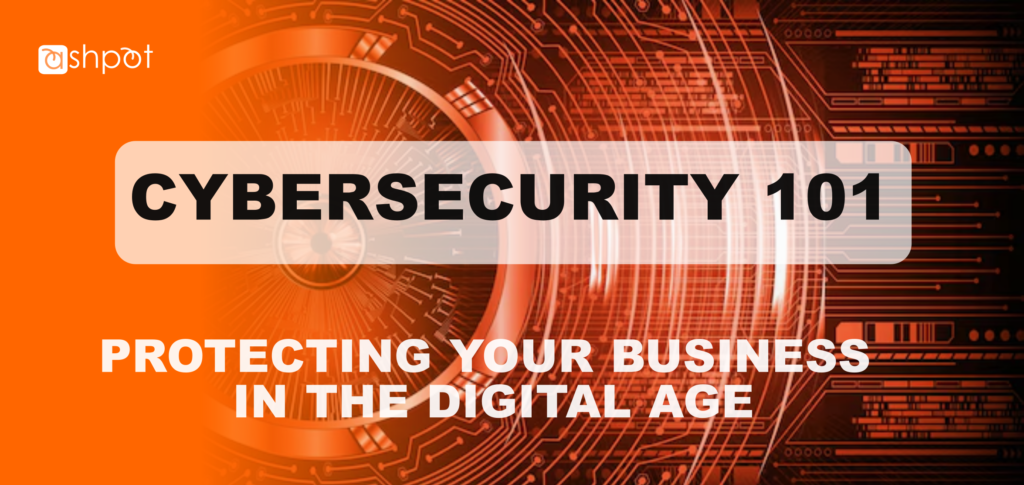In today’s interconnected world, where digital transformation drives businesses forward, the importance of cybersecurity cannot be overstated. As small businesses embrace technology to streamline operations and reach a broader audience, they also become potential targets for cyberattacks. A single breach can compromise sensitive data, harm your reputation, and even disrupt operations.
This guide, “Cybersecurity 101: Protecting Your Business in the Digital Age,” aims to provide essential tips for small businesses and individuals to safeguard their systems and data.
Why Cybersecurity Matters for Small Businesses
Contrary to popular belief, small businesses are not immune to cyberattacks. In fact, cybercriminals often view smaller organizations as easier targets due to their limited resources and less robust security systems.
Key Cybersecurity Risks for Small Businesses
- Phishing Attacks: Fraudulent emails that trick employees into revealing sensitive information.
- Ransomware: Malware that locks users out of their systems until a ransom is paid.
- Data Breaches: Unauthorized access to customer or business data.
- Insider Threats: Employees or contractors accidentally or intentionally compromising security.
According to a recent report, 43% of cyberattacks target small businesses, and 60% of those businesses go out of business within six months of a significant attack. These statistics highlight the need for proactive cybersecurity measures.
Essential Cybersecurity Tips for Small Businesses
1. Train Your Employees on Cybersecurity Best Practices
Your employees are your first line of defense against cyber threats. Regular training sessions can help them recognize phishing emails, understand password security, and avoid risky online behavior.
- Tip: Use simulated phishing tests to gauge employee awareness.
- Example: Teach employees not to click on links or download attachments from unknown sources.
2. Implement Strong Password Policies
Weak passwords are one of the easiest ways for hackers to gain unauthorized access. Enforce a strong password policy across your organization.
- Use a combination of uppercase letters, lowercase letters, numbers, and symbols.
- Require employees to update their passwords every 90 days.
- Encourage the use of password managers for secure storage.
3. Enable Multi-Factor Authentication (MFA)
Multi-factor authentication adds an extra layer of security by requiring users to verify their identity through a second method, such as a text message or biometric scan.
- Tip: Enable MFA for all sensitive accounts, including email, financial systems, and cloud storage.
4. Regularly Update Software and Systems
Outdated software often contains vulnerabilities that cybercriminals exploit. Ensure all software, operating systems, and applications are updated regularly.
- Example: Enable automatic updates to stay protected without manual intervention.
5. Use Antivirus and Firewall Protection
Antivirus software and firewalls act as your business’s digital shield. They detect and block malicious activities before they cause harm.
- Tip: Invest in reputable antivirus software and configure firewalls for both your network and individual devices.
6. Backup Your Data Regularly
Data backups ensure that you can recover important information in the event of a ransomware attack or system failure.
- Store backups in a secure, offsite location or use cloud-based backup solutions.
- Tip: Test your backups regularly to ensure they work correctly.
7. Limit Access to Sensitive Data
Not all employees need access to every piece of information. Restrict access to sensitive data based on roles and responsibilities.
- Tip: Implement role-based access controls (RBAC) and monitor who accesses sensitive files.
8. Secure Your Wi-Fi Network
Unsecured Wi-Fi networks can be exploited by hackers to infiltrate your systems.
- Use a strong password for your Wi-Fi network.
- Hide your network’s SSID (Service Set Identifier) to make it less visible.
- Tip: Set up a separate network for guests to avoid exposing your primary business network.
9. Create an Incident Response Plan
Despite your best efforts, breaches can happen. Having a response plan ensures that you can act quickly to minimize damage.
- Identify a response team and assign specific roles.
- Outline steps for containing and investigating breaches.
- Tip: Test your incident response plan with simulated attacks.
10. Partner with Cybersecurity Experts
If managing cybersecurity feels overwhelming, consider partnering with a managed security service provider (MSSP). They can monitor your systems, detect threats, and provide expert guidance.
How Tools Like Schoolzy Help Protect Educational Institutions
At Ashpot, we understand the importance of cybersecurity in education. Our Schoolzy platform is designed with security at its core, ensuring that schools can manage operations without compromising data safety.
Key Cybersecurity Features of Schoolzy
- Data Encryption: All data transmitted and stored on the platform is encrypted to prevent unauthorized access.
- Role-Based Access: Administrators can control who accesses specific features and information.
- Regular Updates: The platform is continually updated to address vulnerabilities and enhance security.
- Cloud Hosting: Schoolzy operates on a secure cloud environment, protected by advanced firewalls and intrusion detection systems.
Conclusion: Staying Vigilant in the Digital Age
As small businesses and individuals navigate the digital age, cybersecurity must remain a top priority. By implementing the tips outlined in this guide, you can significantly reduce your risk of falling victim to cyberattacks.
Remember, cybersecurity is not a one-time task but an ongoing process that requires vigilance, education, and adaptation. Whether you’re running a small business, managing a school, or simply safeguarding personal data, staying informed and proactive is the best defense against cyber threats.
At Ashpot, we’re committed to empowering businesses and educational institutions with the tools and knowledge they need to thrive securely in the digital age. Let’s work together to create a safer online environment for everyone.

